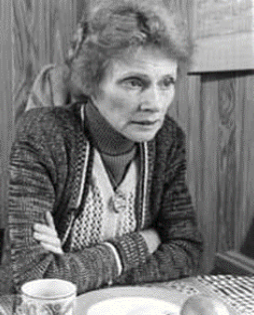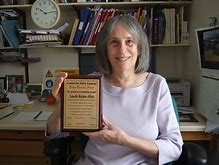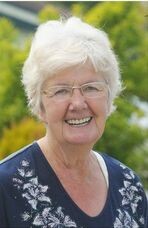International Women's Day - Courageous and Campaigning Women on Mesothelioma.
05 Mar 2019
Mesothelioma is an asbestos-related cancer, which predominantly men develop. However as we mark International Women's Day, we want to highlight some of the courageous and campaigning women who have been involved in trying to improve both the medical and legal landscape around this cancer and to ban the use of asbestos worldwide.
This article couldn't possibly name all the women who have been involved as there are so many and it should be acknowledged, that there are lots of men to who campaign on behalf of asbestos sufferers and their families.
Here are just a few:-

Alice Jefferson who was from Mytholmroyd, Hebden Bridge worked for Cape Asbestos at their factory, Acre Mill, for a few months when she was a teenager. Years later in her forties whilst her children were still young, she developed mesothelioma. Alice went on to feature in a documentary named after her, ‘Alice, a fight for Life’ which was first broadcast on the 20th July 1982 and highlighted the dangers of asbestos and the working conditions she had faced. Alice took Cape to court and won compensation. She died not long after the filming was finished.
Her solicitor John Pickering said of the documentary “The programme was an important catalyst for legal change and public awareness of the plight of the victims of asbestos.”
Geoffrey Tweedale said of the documentary on its 25th Anniversary: "Much of the documentary's impact was due to its unremitting focus on Alice, who demonstrated enormous fortitude in the face of a pitiless disease.
Her physician described her as a "typical West Yorkshire lass. She's tough and realistic and you can't kid this lady. This lady knows exactly what the score is."
Alice's reaction was to fight, especially for her husband and young son and daughter. As she explained: "You just can't give in, can you? You owe it to yourself and your family to keep fighting, don't you? And when you get knocked down, get up and stand there again ..."
Alice had been offered £13,000 by Cape Asbestos as a settlement, but after she willed herself to attend court, dosed with morphine and scarcely able to stand unaided, that offer was increased to £36,000. Alice remarked that it was not much, when what she needed was a new body

Nancy Tait was a campaigner until her death in 2009 about the dangers of asbestos exposure. Her husband, Bill died from mesothelioma in 1968 when the link between asbestos exposure and mesothelioma had only recently been established such that the Post Office for whom he had worked refused to accept responsibility.
Nancy began a campaign to seek recognition that he died of an industrial disease and would continue her campaigning for over 40 years not just on mesothelioma but on other conditions which were caused by work. She produced a booklets in 1976 “Asbestos Kills”. She assisted families with benefits appeal for Industrial Injuries Disablement Benefit.
In 1978 she established, the campaigning group, the Society for the Prevention of Asbestosis and Industrial Diseases (SPAID) which from 1996 was known as the Occupational and Environmental Diseases Association (OEDA).
Nancy was awarded an MBE in 1996
The opening paragraph of her obituary in the Guardian in 2009 read: “Nobody achieved more than Nancy Tait, who has died aged 89, in raising awareness about the hazards associated with asbestos exposure. Driven by her own search for justice she campaigned for victims of asbestos diseases and helped more than 3,000 families pick their way through a legal and scientific labyrinth.”

June Hancock and Evelyn Margerson.
Both women were affected by the asbestos used at the JW Roberts Factory in Armley. For June, she developed mesothelioma from which she died on the 19th June 1997. For Evelyn, it was her husband Arthur Margereson who died in 1991 from mesothelioma.
Arthur Margereson was born in 1925 and lived approximately 200 yards away from Midland Works of the JW Roberts Factory in Armley, Leeds for his entire life. He did not ever work there but he was exposed to asbestos from the site.
June Hancock had also grown up next to the Midland Works, and had never worked inside the factory. Her mother died of mesothelioma in 1982, and June was diagnosed with the cancer herself in 1993
The two women pursued their claim against Turner & Newalls for the environmental exposure to asbestos from the Armley Factory. The two cases were heard over six weeks at Leeds High Court in 1995 which then went to the Court of Appeal. They were fighting not just for themselves but also for others who had and would develop asbestos conditions from living near to the Armley Factory.
T&N conceded before the trial that Hancock's and Margereson's illnesses were caused by asbestos from the factory, but any compensation depended on proving that the company knew or should have known the dangers the dust could cause.
Three months after the hearing ended Mr. Justice Holland handed down a written judgment, finding for June and Evelyn, and awarded damages of £65,000 to June Hancock and £50,000 to Evelyn Margereson. The judge ruled T & N was responsible on the grounds that the risks of asbestos dust exposure had been known by T & N since 1933 and it was foreseeable that children allowed to play in the vicinity of the factory would be exposed to the risk of pulmonary disease. This was a landmark decision, extending as it did the duty of care beyond factory employees to those outside a factory's walls
June said after the ruling: "The money won't do me much good, but there's no other way they can pay. The only way they can answer for what they did is money."
These 2 women paved the way for others to pursue claims for environmental exposure to asbestos.
Following June’s death, a charity was set up in her name, The June Hancock Mesothelioma Research Fund, which to this day continues to support victims of mesothelioma and mesothelioma research projects.
More information about the charity can be found here

Laurie Kazan Allen has been a campaigner for over 25 years. She has worked with various different organisations and activists to try and ban asbestos throughout the world for which the different groups have had significant success.
She is the Founder and Editor of the British Asbestos Newsletter which for over 25 years has published articles on the subject of asbestos and highlighted the issues surrounding this.
She is also the Co-ordinator of the International Ban Asbestos Secretariat.
Further information can be found here

Lucy Stephens is a campaigner for the removal of asbestos from schools. Her mother Sue, died from mesothelioma in 2016 as a result of her exposure to asbestos was when working as a schoolteacher for over 30 years. Lucy made a promise to her mum that she would campaign for asbestos to be removed to protect future teachers and children.
She set up a petition calling for the Government to make sure all schools produce an annual report about the type and condition of the asbestos in the school premises and make staff and parents aware of it. The petition also calls for the Government to introduce a policy to remove all asbestos by 2028 from schools.
The petition currently has over 90,500 signatures.
Lucy continues to campaign and highlights issues of asbestos in school on a regular basis.
Further details of her campaign can be found here
Vivienne Swain developed mesothelioma from washing her husband’s overalls in the 1960’s and 1970’s.
She did not let her illness define her and lived her life to the full.
She undertook various different clinical trials.
She spoke at Action Mesothelioma Day and at an Asbestos Study Day in Manchester in 2017 attended by delegates from various different countries including Japan, Australia, Spain, Italy, Belgium and France.
She campaigned and highlighted the issues faced by mesothelioma sufferers in pursuing claims for compensation including meeting with Lord Justice Jackson to discuss his proposed legal cost reforms.
She was an avid supporter of the Greater Manchester Asbestos Victims Support Group and Mesothelioma UK and a founder attendee of the Living Well with Mesothelioma Support Group in Manchester.

Mavis Nye developed mesothelioma from her husband’s clothes and overalls. He worked at Chatham Dockyard as an apprentice in the 1950’s.
In 2009 she was diagnosed with mesothelioma. Since that time she has become a Mesowarrior, highlighting the issues faced by those with mesothelioma. She has undergone trials including an Immunotherapy Trial which shrunk her mesothelioma.
Mavis set up the Mavis Nye Foundation details of which can be found here.
The foundation was set up “to inspire victims of mesothelioma, an asbestos related terminal Cancer. To give hope to fellow victims and show a light at the end of the tunnel.”
The foundation intends to make Grants to promote clinical research for which it is currently open for applications.
She has presented at various different conferences and to small groups including to Professors, Oncologists and MP`s. She has spoken in the House of Commons and was awarded a BCA for her work. She sits on various committees and support groups.

Liz Darlison is a Consultant Nurse at the University Hospitals of Leicester and Head of Services for Mesothelioma UK.
Liz was a founder of Mesothelioma UK, a national charity set up to support mesothelioma sufferers and their families by providing information, support and education.
Liz is a committee member for the National Lung Cancer Forum for Nurses and a member of the British Thoracic Oncology Group steering committee.
Liz gives numerous talks each year on mesothelioma, the work of Mesothelioma UK, the availability of clinical trials and the charity’s plans for the future.
Mesothelioma UK now has a growing number of clinical nurse specialists working throughout hospitals in the UK supporting mesothelioma sufferers and their families.
They provide information on clinical trials available to mesothelioma sufferers and aim to be a one stop shop for sufferers and their families.
Details of the Charity can be found here
There are of course countless other women, too many to mention, who have been involved in campaigns to ban asbestos, to support asbestos sufferers and to promote the rights of women whether through test cases such as the cases of Fairchild, Barker, Rice or The Trigger Litigation or through the lobbying of those in power and they too should all be remembered on International Women’s Day.




